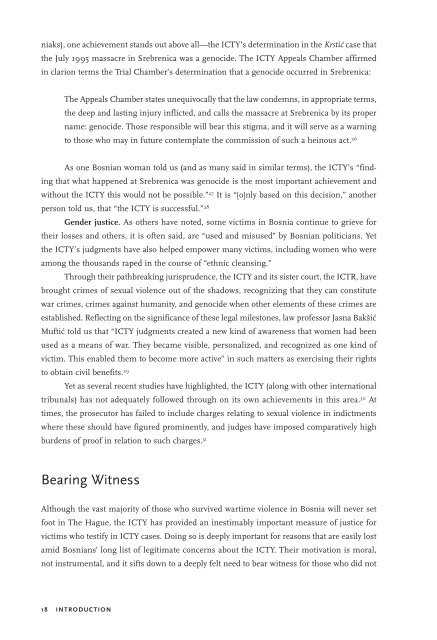That Someone Guilty Be Punished - Open Society Foundations
That Someone Guilty Be Punished - Open Society Foundations
That Someone Guilty Be Punished - Open Society Foundations
You also want an ePaper? Increase the reach of your titles
YUMPU automatically turns print PDFs into web optimized ePapers that Google loves.
niaks), one achievement stands out above all—the ICTY’s determination in the Krstić case that<br />
the July 1995 massacre in Srebrenica was a genocide. The ICTY Appeals Chamber affirmed<br />
in clarion terms the Trial Chamber’s determination that a genocide occurred in Srebrenica:<br />
The Appeals Chamber states unequivocally that the law condemns, in appropriate terms,<br />
the deep and lasting injury inflicted, and calls the massacre at Srebrenica by its proper<br />
name: genocide. Those responsible will bear this stigma, and it will serve as a warning<br />
to those who may in future contemplate the commission of such a heinous act. 26<br />
As one Bosnian woman told us (and as many said in similar terms), the ICTY’s “finding<br />
that what happened at Srebrenica was genocide is the most important achievement and<br />
without the ICTY this would not be possible.” 27 It is “[o]nly based on this decision,” another<br />
person told us, that “the ICTY is successful.” 28<br />
Gender justice. As others have noted, some victims in Bosnia continue to grieve for<br />
their losses and others, it is often said, are “used and misused” by Bosnian politicians. Yet<br />
the ICTY’s judgments have also helped empower many victims, including women who were<br />
among the thousands raped in the course of “ethnic cleansing.”<br />
Through their pathbreaking jurisprudence, the ICTY and its sister court, the ICTR, have<br />
brought crimes of sexual violence out of the shadows, recognizing that they can constitute<br />
war crimes, crimes against humanity, and genocide when other elements of these crimes are<br />
established. Reflecting on the significance of these legal milestones, law professor Jasna Bakšić<br />
Muftić told us that “ICTY judgments created a new kind of awareness that women had been<br />
used as a means of war. They became visible, personalized, and recognized as one kind of<br />
victim. This enabled them to become more active” in such matters as exercising their rights<br />
to obtain civil benefits. 29<br />
Yet as several recent studies have highlighted, the ICTY (along with other international<br />
tribunals) has not adequately followed through on its own achievements in this area. 30 At<br />
times, the prosecutor has failed to include charges relating to sexual violence in indictments<br />
where these should have figured prominently, and judges have imposed comparatively high<br />
burdens of proof in relation to such charges. 31<br />
<strong>Be</strong>aring Witness<br />
Although the vast majority of those who survived wartime violence in Bosnia will never set<br />
foot in The Hague, the ICTY has provided an inestimably important measure of justice for<br />
victims who testify in ICTY cases. Doing so is deeply important for reasons that are easily lost<br />
amid Bosnians’ long list of legitimate concerns about the ICTY. Their motivation is moral,<br />
not instrumental, and it sifts down to a deeply felt need to bear witness for those who did not<br />
18 INTRODUCTION

















